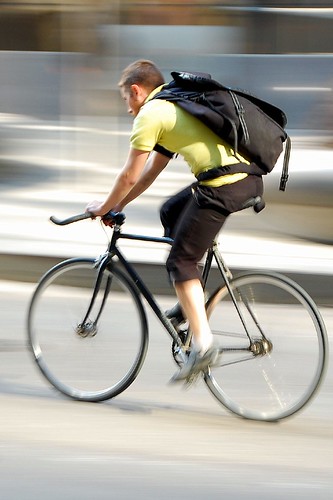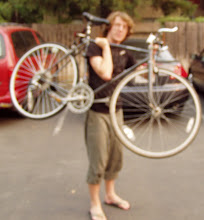My dad has told me that, provided I get a fellowship or the like for grad school, he will buy me tickets to Europe as a graduation present. We Vidrines are a traveling kind of family. We are in fact travel
savvy. I guess it comes from practice or more likely, from my late grandfather. Nine years ago my dad, sister, grandfather, aunt, uncle and I went to France. It was the greatest trip of my life.

There are many ways to travel. You can get a package deal where planes, buses and hotels are managed by an agency. These tend to be built around seeing as many famous sites in as little time as possible, like the telling "seven countries in twenty days" European travel package. As somebody related to me once said, "You don't get the
feel of any of the countries." Many people plan trips along similar lines to travel packages, staying in American-style hotels and spending their time hitting major tourist draws. This too, robs the traveler of the cultural experience that is so central to great international travel. College students travel through hostels and trains. I will agree that that is a better way, but besides the main attractions for which Europe is famed, college students like to hit London for the pubs, Germany for the pubs, and Amsterdam for the legal pot. Like you can't smoke and drink underage to your heart's content stateside.
Though Vidrine travel plans vary depending on finance, we have a definite aesthetic. We make a point of spending more time in less places. We stay away from Americans and Americanized things. We thoughtfully make our own travel plans, except when in the interest of keeping our twenty-plus family members together at once. Ideally and frequently, we use local friends as tour guides. That said, we definitely hit the major attractions in Paris and
enjoyed McDonald's after starting to miss familiar food.
On our first full day in France nine years ago, it was my birthday. We spent that day on a marathon tour of Paris. The elevator in the Eiffel Tower was broken, so we only got to the second level. I had one of the worst steaks I have ever tasted (I was learning the Vidrine method by trial and error too). For my birthday dinner, we had a snotty waiter. This merits a digression concerning the reputation of the French.
First of all, when people say the French are rude, they mean Parisians. Most Americans reporting have only spent significant time in Paris anyways. Secondly, most of this rudeness has to do with that thing most precious to all Frenchmen, their language. Americans know that most Europeans speak English, so the first question is usually, "Do you speak English?" Innocent sounding enough, but because English is the worldwide
lingua franca, it hits a nerve with the French. The phrase itself originally meant
the french language, because French was the international language when France dominated Europe culturally and militarily. So by expecting them to speak English, we are rubbing their noses in the fact that we have replaced them. Americans consequently come off as rude towards the French because we take such little interest in other languages. The English don't have this problem because they do take interest and they neither feel nor seem privileged. The third reason the French have a reputation for being rude is that, well, they are a little. But not too much. We met intensely nice French people everywhere we went and especially in the countryside. It helped on my trip that my dad and grandfather were native speakers. So don't judge France by Paris,
try to speak French (believe me, it will be appreciated) and roll with the punches. France is a very traveled place in spite of their reputation for a reason, after all.

So ever since my dad told me about my graduation present I've been thinking about what I want to do. First on the list is going to the very top of the Eiffel Tower and to the Louvre, two things I missed on my eleventh birthday. Also, I think I've convinced
Caius to come with me. He's got family contacts throughout Europe and hopefully we can stay with his grandmother in Romania for a while. I can't wait to see German villages and Vienna on the way. I'll be busting out my own family contacts, so between the two of us I think we'll have most of our sleeping accommodations covered. Obviously I want to stay in a hostel once, but I think I'll try to fill in the rest of the gaps by
couch surfing. In addition to the significant money concerns (the cheaper I live the longer I can afford to stay), couch surfing's philosophy fits perfectly with the Vidrine aesthetic. As my grandfather always said, and particularly so in France, allons-y!










